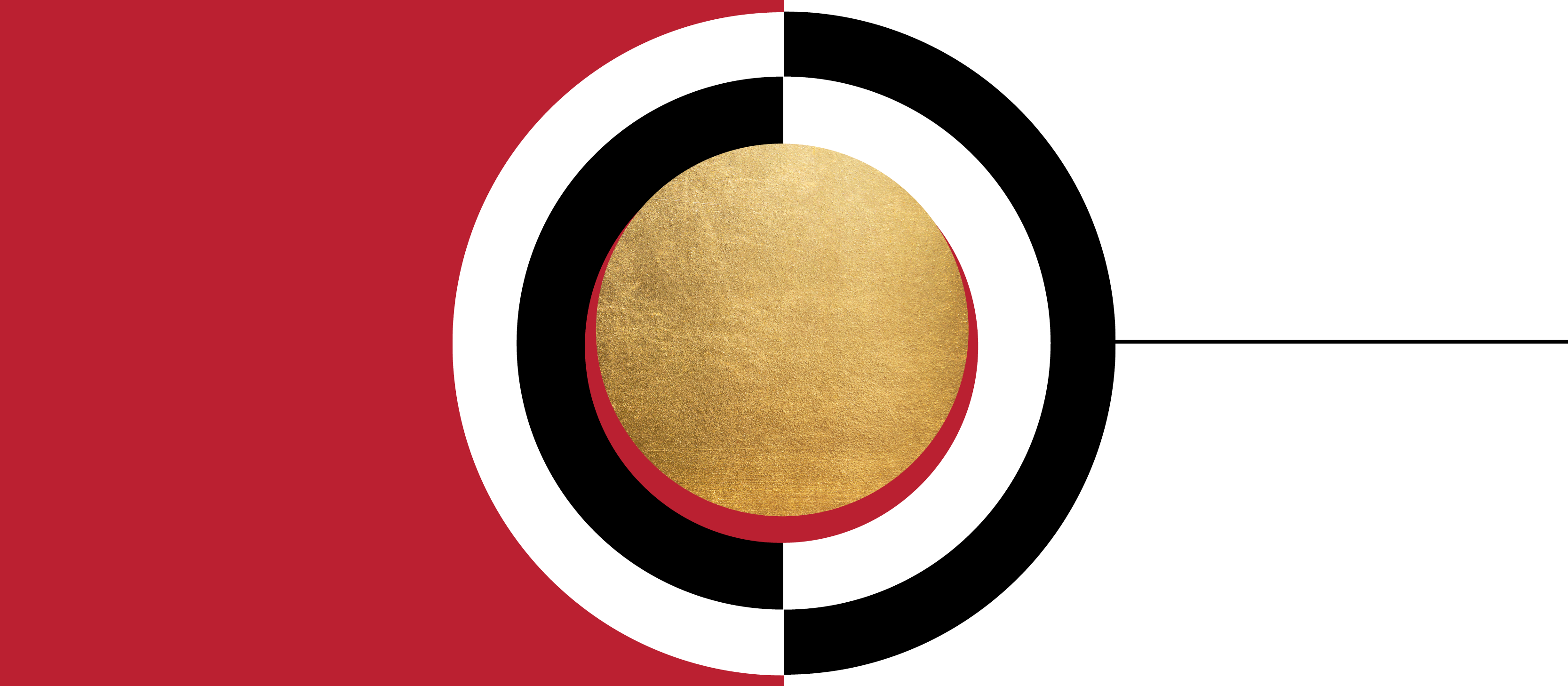
The goals of the Society of Fellows are to support faculty research and creative practices that highlight the transformative power of the arts and humanities to address global challenges and social needs; develop shared responses; and facilitate the multi-disciplinary exchange of ideas and methods on a shared topic.
The Global Arts + Humanities Society of Fellows brings Ohio State faculty from across the disciplines together to share research around an annual cross-disciplinary theme. These fellowships are designed to provide faculty with release time to focus on their scholarly and artistic work, as well as with opportunities to engage with other Ohio State faculty, students and local Columbus community organizations. In addition to participating in a biweekly seminar, fellows co-organize a culminating year-end event to share their work.
To date, this program has supported 50 faculty fellows.
Introducing the 2025-26 Faculty Fellows
Annual Theme: Artificial Intelligence | Creativity • Intelligence • Automation

YuHao Chen
External Fellow
Chen's project examines early gramophone records made to capture Chinese speech sounds at the turn of the twentieth century. It situates the phonographic capture of Chinese spoken words in parallel to a Western interest in phonetically transcribing foreign utterance. The project highlights issues around the technological mediation of the Sinophone voice as hearing-based inscriptions.
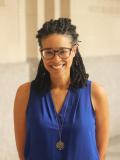
Associate Professor Jennifer Eaglin
Department of History
Eaglin’s project intertwines interests of energy, nation and environment to examine the environmental questions at the center of Brazil’s nuclear pursuits. As countries look to nuclear energy to power AI infrastructure, this project examines the various actors that historically shaped this domestic energy industry and its position in the country’s energy future.

Associate Professor Jamison Kantor
Department of English
Kantor focuses on Romantic literature and the black diaspora in the eighteenth and nineteenth centuries. He is interested in literary depictions of materialism and their relationship to modern political movements like Marxism, Liberalism and Conservatism. Kantor also writes about popular film, its politics and genres. His recent essays and reviews have been featured in Critical Inquiry, The Eighteenth Century: Theory and Interpretation, Jump Cut, and PMLA.
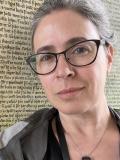
Associate Professor Merrill Kaplan
Departments of English, and Germanic Languages and Literatures
Kaplan writes about medieval Scandinavian literature, Norse mythology and traditional narrative and folk belief about the supernatural. She is interested in the affordances of different media for the communication of expressive culture, and she has published about the odd workings of folklore in online environments. Her current project for 2024-25 concerns the significance of LLM AI technologies for folklorists’ understanding of what we do as scholars of tradition.
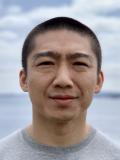
Associate Professor Eden Lin
Department of Philosophy
Lin’s area of specialization is ethics. Much of his research focuses on welfare or well-being – what kind of life qualifies as a life that is going well for the person living it. He also has an interest in the risks to humanity posed by advanced forms of Artificial Intelligence. His work has appeared in journals such as Ethics, Noûs, The Philosophical Review, and Philosophy and Phenomenological Research.
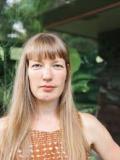
Associate Professor Kris Paulsen
Leadership Faculty Fellow
Department of History of Art
Paulsen is a specialist in contemporary art, with a focus on time-based and computational media. Her work traces the intersections of art and engineering, with a particular emphasis on telepresence, virtuality and Artificial Intelligence. Her current book project, Future Artifacts, examines how contemporary artists strategically deploy the emergent technologies and science-fiction fantasies that fuel capitalist speculation to redress Silicon Valley’s techno-utopian promises.

Postdoctoral Scholar Timothy Liam Waters
Center for Folklore Studies and the Humanities Institute
Waters' project examines literary materialisms, generative AI and folkloric reception of the Old Norse literary corpus. He has taught undergraduate courses on topics such as the representation of myth in modern media, Viking-Age travel literature and Old Norse language. He currently serves on the editorial board of the journal, Old Norse Studies.
Previous Cohorts
2024-25 Society of Fellows Cohort
Facilitators
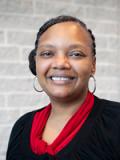
Stephanie Power-Carter
GAHDT Leadership Faculty Fellow
Professor, Teaching and Learning
Stephanie Power-Carter is a professor in the Department of Teaching and Learning and the Director of the Center for Video Ethnography and Discourse analysis (CVEDA). Her passion is to engage in research that helps us to see each other’s humanity more fully. She uses discourse analysis a way to see and examine how people use language to negotiate their identities and to better understand how Black youth, and youth from historically resilient communities navigate their educational experiences. Power-Carter's scholarship examines the resilience, possibility and potential of Black youth.

Christa B. Teston
GAHDT Leadership Faculty Fellow
Andrea Lunsford Designated Associate Professor of English
Teston studies how humans navigate uncertainty in technoscientific, biomedical and media-rich domains. Specifically, she researches the evidential backstage, or all the work that goes on behind the scenes when experts attempt to corral chaos. Her first book — Bodies in Flux: Scientific Methods for Negotiating Medical Uncertainty (University of Chicago Press) — critiques the fetishization of certainty and advocates for an ethic of care that honors human fragility and bodily flux.
Fellows
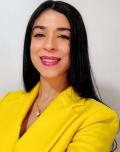
Marta Castilho da Silva
External Fellow
Project Title | Politics of Care: Well-Living, Indigenous Futurities, and the Protection of Biodiversity
The increasing presence of a predatory transnational agribusiness in Brazil is accelerating global warming. This project involves collaboration with the Dourados Indigenous Women Association efforts to recover ecosystems and establish “well-living” — a mode of sociability grounded on solidarity, care, respect and harmony with nature. Through this collaboration, Politics of Care will create guidelines for policies aligned with caring and just politics regarding indigeneity and the environment; and advance scientific understanding about how cultural frameworks based on care have fueled grassroots strategies for thriving in politically unfavorable environments.
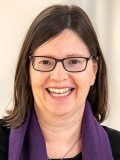
Janet Childerhose
Research Assistant Professor, College of Medicine-Division of Internal Medicine
Project Title | The Overdose Stories
Over 150 people die each day from unintentional consumption of fentanyl and xylazine. Care for people who overdose is often informed by the addiction model of substance use often conjoined with narratives about the current opioid crisis. What these narratives obscure are individual stories of people who have experienced overdose and what just care means to them. The Overdose Stories will amplify the voices and recommendations of people who are experts at staying alive in an unsafe environment and include the creation of an installation of overdose stories and photographic portraits based on interviews with up to 20 Ohio residents who have experienced a non-fatal drug overdose.
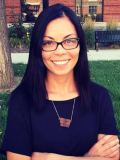
Namiko Kunimoto
Associate Professor, History of Art
Project | Urgent Animations
This project situates Japanese Empire as a world-historical event that continues to exert profound influence over political dynamics and, crucially, the broad set of contemporary art practices that foreground collective care and work toward justice in the extended wake of twentieth-century Japanese militarism. Through analyses of works by contemporary Transpacific artists, Urgent Animations highlights the lingering present-ness of Japanese Imperialism to press for justice in current-day politics at a time of heightening anti-Asian racism in North America and increasing nationalism in Japan.
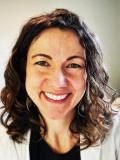
Ashley Hope Pérez
Assistant Professor, Comparative Studies
Project Title | Sustaining Advocacy for Reader's Rights
This project addresses the harms of book bans — including impacts on creative expression, implications for education, and injury to students. Sustained engagement with the fight for readers’ rights frequently comes at a high cost. Resisting book bans is slow and often isolating work. Those invested in censorship and exclusion excel at creating a toxic, hostile environment for authors, educators, students and their allies. Sustaining Advocacy for Readers’ Rights focuses on intentionally weaving an engagement with care into proreader advocacy and social justice work.

Margaret Price
Associate Professor, English
Project Title | Transformative Access: Building Collective Care in Institutional Spaces
Personal Website
This project investigates when and how acts of care including “transformative access” and “collective accountability” occur in academe. Through the building of an accessible, publicly-available digital archive and co-authored article, Transformative Access emphasizes relational processes that center race, ethnicity, disability, class, gender, sexuality, and coalitional work, and that specify access as a form of care. Collective accountability, as used here, is a construct that deliberately counters institutions’ tendency to co-opt the terms care or culture of care.
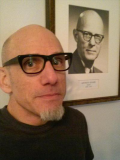
David Ruderman
Associate Professor, English (Newark campus)
Project Title | Poetry in the Fields of Poverty and Addiction
Substance use disorder is not just an individual issue but can be linked to other collective and ongoing political, public health, spiritual and economic crises. This project builds on a poetry-writing project begun as part of the Day Reporting Program in Newark, Ohio, which offers people charged with low-level drug offenses the opportunity to participate in a 90-day program in lieu of jail or prison. Participants receive GED training, group therapy, drug and alcohol counseling, parenting classes and creative arts therapy. Poetry in the Fields of Poverty and Addiction involves the curation of a collection of poems by and oral histories of people living with and struggling to recover from substance use disorder in Newark, Ohio, and research for a larger book project entitled Literatures of Addiction.
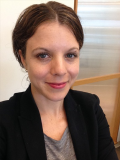
Johanna Sellman
Associate Professor, Near Eastern and South Asian Languages and Cultures
Project Title | Narratives of Care Across Borders in Contemporary Arabic Literature
This project compares contemporary Arabic literary narratives in migrant and postmigrant settings and how they center the natural environment or other ecologies and systems that counter binary notions of belonging and deservingness (victim/perpetrator, idealization/demonization/ and deserving/non-deserving) seen in many border building practices and discourses. Narratives of Care across Borders highlights texts written by women authors that probe the political and social fabric that precede forced migration or are part of its aftermath. This project suggests that literary explorations of ecologies and systems invite re-orientation toward how care and justice can be cultivated in creative and generative ways.

Lucille Toth
Associate Professor, French and Italian
Project | Decolonizing Dance/Movement Therapy
Personal Website
This project interrogates the concept and practice of Dance/Movement/Therapy through the lens of decoloniality and proposes a path towards a more global understanding and practice of care through movement. Informed by qualitative engagements with immigrant populations, this project links community care to migration and dance and prompts collective inquiry about decolonial practices within the dance studio. Decolonizing Dance/Movement Therapy will yield a book chapter that focuses on the mechanics of decolonizing dance and a companion somatic protocol — a step-by-step guideline to facilitate non-verbal, movement-based workshops.

Amy Youngs
Associate Professor, Art
Project Title | Soil Culture Parade
A celebration of soil, enacted by participants in a procession that includes the myriad of ways that soil ecosystems are made, remade, understood, valued and cared for. This is an inherently entangled and multidisciplinary affair; involving the multitudes of non-human organisms who co-construct the soils that make human lives possible, as well as geological, agricultural and cultural forces that act upon them. Soil Culture Parade makes this complex ecosystem visible through art, costumes, music and performances activated by people who have participated in workshops and events celebrating soil culture and care. The workshops include the building of Soil Wagon, a sculptural, wheeled structure that houses a living soil ecosystem and requires collaboration with worms, minerals, waste and a team of human Soil Carers.
2023-24 Society of Fellows Cohort

DAVID ADAMS (he/him) Associate Professor, Department of English (Lima campus)
Project title: Ableist Keywords: Dismantling Psychiatric Knowledge
Project abstract: Ableist Keywords is a series of essays on terms that are integral to psychiatric knowledge: terms used to justify stigma, coercion and control — often leading to involuntary confinement and restraints (chemical and physical). Such terms include “psychosis,” “anosognosia,” “paranoia,” “delusion,” “hallucination” and “mental” in its various compound formations (e.g. “mental illness”). Moving beyond critiques of the American Psychiatric Association’s Diagnostic and Statistical Manual (DSM), this work will help bring urgent awareness of the social construction of psychiatric terms to an area of experience still dominated by the medical model.

ANNA BABEL (she/her/Ella) Associate Professor, Department of Spanish and Portuguese
Project: Public-facing project on drug interdiction system
Project abstract: Babel is working with data from dossiers compiled by U.S. law enforcement concerning the arrest of drug smugglers in international waters to create a public-facing research project. In particular, the dossiers comprise “character” letters from family members pleading for sentencing leniency for their loved ones. Babel’s analysis aims to draw attention to the efforts of this hidden prison population as they seek to persuade and advocate for themselves and their loved ones drawn into an adversarial position within a foreign legal system.

JONAS N.T. BECKER (they/them) (External Fellow) Associate Professor, School of the Art Institute of Chicago
Project title: Better or Equal Use
Project abstract: Better or Equal Use is a series of photographs made from coal dust that depict redevelopments on former mountaintop removal mining sites in Appalachia. The 23 redevelopments depicted in this series were ushered in by a congressional act mandating that once mining was complete, companies must redevelop sites for “equal or better economic or public use,” thus pitting the value of the untainted natural landscape against commercial and industrial functions. The full series will be premier in a solo exhibition at the Wexner Center for the Arts in 2025 and will also be published as a book.

RYAN FRIEDMAN (he/him) Professor, Department of English
Project title: Holding Their Own: African American Musical Specialties in U.S. Cinema
Project abstract: Friedman is focusing exclusively on white-produced Hollywood specialties — non-narrative scenes featuring well-known Black musical performers “as themselves,” playing to a white onscreen audience — a phenomenon which film scholars have reduced to a cinematic enactment of Jim Crow. Friedman’s current book project, Holding Their Own: African American Musical Specialties in U.S. Cinema, examines the wider history of Black specialties in 1930s and 40s film, to argue that these scenes, in fact, critique oppressive structures and act as crucial sites of African American freedom dreaming.
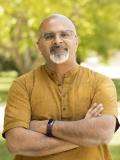
PRANAV JANI (he/him) Associate Professor, English
Project title: 1857 and the Anticolonial Imagination: Militancy, Nationalism and the Spectre of Hindutva
Project abstract: Jani’s book project aims to clarify the relationship between abolition, revolution and emancipatory horizons that are hidden behind the towering figure of Gandhi. Examining a range of media, Jani traces the uneven process by which the armed anticolonial Rebellion of 1857 was gradually integrated into popular nationalist consciousness by militants. Involving large-scale mutinies of Indians in the British army and peasant revolts, the 1857 Rebellion literally took back land from the British before it was defeated and gave shape to South Asian ideas about decolonialization and liberation.
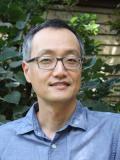
PIL HO KIM (he/him) Associate Professor, Department of East Asian Languages and Literatures
Project title: Freedom Dreaming Across the Pacific
Project abstract: Abolitionism was a transnational movement by nature, but its geographic focus remained largely on the Atlantic side of the globe between Africa, Europe and the Americas, where the Atlantic slave trade took place. However, by the early twentieth century, the global impact of the abolitionist movement was no longer confined to the Western Hemisphere as the wave of colonization by imperial powers swept across the Pacific to subjugate the peoples of East Asia. This project aims to gather experts who can illuminate the lesser-known history of freedom dreams across the Pacific through a series of public talks and exhibitions as well as academic workshops and publications.
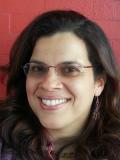
MIRANDA MARTIENZ (she/her) Associate Professor, Department of Comparative Studies
Project: Book project on issues of financial inclusion and debt abolition
Project abstract: Martinez’s project explores wealth building initiatives that challenge systemic financial predation directed at minority communities that attempt to transform the everyday experience of “the financial” from one of extraction towards new liberatory possibilities. The book is organized around questions of financial inclusion and self-determination and also interrogates a series of case studies about how financial institutions like credit unions try to reimagine the financial as a site of sociality and pleasure.
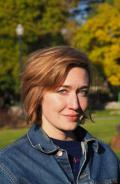
AMY SHEERAN (she/her) (External Fellow) Associate Professor, Otterbein University
Project title: Segismundo Dreams of Freedom
Project abstract: Yielding two academic articles, this project proposes a radical new reading of a classic text — Pedro Calderón de la Barca’s c. 1629 play, La vida es sueño (Life Is a Dream), by exploring the nascent early modern racialization of skin color. The project also aims to advance an in-progress video game adaptation of the play through the early prototyping phase. Together, both the articles shed new light on a foundational work, while the public-facing digital humanities artifact makes it accessible to players as they explore the relationships among dreams, reality, freedom and game worlds.
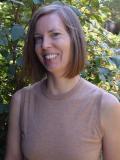
JENNIFER SUCHLAND (she/her) Associate Professor, Departments of Women’s, Gender and Sexuality Studies & Slavic and East European Languages and Cultures
Project title: Are Human Rights Obsolete?
Project abstract: Suchland’s project is rooted in anti-carceral critiques of the U.S. anti-trafficking apparatus. Made of policies, discourses and socio-legal practices, that apparatus seeks to “save” victims of trafficking and punish individual perpetrators. Yet, everyone caught within the anti-trafficking apparatus is entangled in a colonial and carceral human rights regime that cannot be undone by reform. Indebted to the civilizational claims of western “man” and “inalienable” rights, human rights are a symptom of the same colonial technologies that alienate land from life and create life out of managed death. In feminist debt to Angela Davis, Suchland asks: Are human rights obsolete?
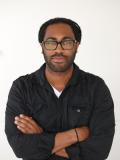
JARED THORNE (he/him) Associate Professor, Department of Art
Project title: 26 Planned Parenthoods
Project abstract: Thorne’s project seeks to photograph every remaining Planned Parenthood facility in Ohio, Indiana, Kentucky, Michigan and Pennsylvania. Alongside the images will be written testimonials from people who work at the healthcare facilities. Upon completion, he plans to create a book that serves not only as a document but as a catalyst for discussion about gender, race and class within the American landscape. It is shocking to see where the Supreme Court has left the most vulnerable women, who are disproportionally women of color in the Midwest. The overturning of Roe v. Wade has turned the project into a living archive.
Facilitators
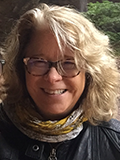
WENDY S. HESFORD (she/her) | Faculty Director, Global Arts + Humanities; Professor, Department of English; Ohio Eminent Scholar of Rhetoric, Composition and Literacy
Wendy S. Hesford is a professor of English and Ohio Eminent Scholar of Rhetoric, Composition and Literacy and the Faculty Director for the Global Arts + Humanities Discovery Theme. She has affiliate appointments in women’s, gender and sexuality studies and comparative studies. She is interested in the transformative role that critical human rights literacy plays in exposing the violence of representation, revealing hidden, repressed and silenced stories.

TREVA LINDSEY Leadership Faculty Fellow, Global Arts + Humanities; Professor, Department of Women’s, Gender and Sexuality Studies
Treva Lindsey is the co-founder of Black Feminist Night School at Zora’s House. Her research and teaching interests include African American women’s history, Black popular and expressive culture, Black feminism(s), hip hop studies, critical race and gender theory, and sexual politics. Her most recent book, America Goddam: Violence, Black Women, and The Struggle for Justice (University of California Press) was described as “required reading for all Americans” in a starred Kirkus review.
2022-23 Society of Fellows Cohort
Fellows

FRANCO BARCHIESI Associate Professor, Comparative Studies & African and African American Studies
Project Title | Labor History, Social Death and the Birth of the Black Worker
Project Description | The archives carry traces — steeped in a discourse of social alarm and moral panic — of how the formerly enslaved and the newly colonized considered labor contracts a continuation of racial slavery: a paradigm of social death. This project is intended as a critical methodological intervention on labor history’s assumption that in the anti-Black archive one can find a transparent record of Black workers’ subjectivity, an assumption that ironically fulfills the institutionalized desires underpinning the archive itself.
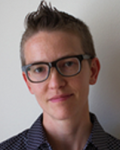
HARMONY BENCH Associate Professor, Dance
Project Title | Dance as Embodied Knowledge and Archive
Project Description | What would it mean for scholars to take seriously the idea that dancers’ bodies are archives, and that the language used in dance training is a shared repository of embodied knowledge? Can new experimental and experiential approaches to dance-based knowledge practices support a paradigm shift within the study of dance histories? This project will build upon previous engagement with print archives of twentieth-century African American choreographer Katherine Dunham — with collaborator Kate Elswit (Royal Central School of Speech and Drama) — on the project Dunham’s Data: Katherine Dunham and Digital Methods for Dance Historical Inquiry.
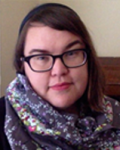
MELISSA CURLEY Associate Professor, Comparative Studies
Project Title | Collection, Preservation and Display of Human Body Fragments in Modern Japan
Project Description | This project explores the collection, preservation and display of human body fragments in modern Japan. It interrogates the changing meanings of the body — and so the changing meanings of subjectivity, materiality and animacy — in the modern period, looking first at how temples borrow tactics of record-keeping, cataloguing and display from museums and modern memory institutions in order to frame the body parts they are responsible for as historical and scientific artifacts or artworks, and second at how modern memory institutions borrow ritual strategies from temples and shrines to manage fissures in the historical record.
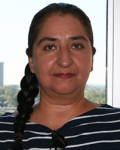
ALCIRA DUEÑAS Associate Professor, History-Newark
Project Title | Building Empire from the Native Village: Indigenous Archive Making and the Legal Culture of the Colonial Andean Pueblo
Project Description | The importance of Indigenous actors in the Spanish empire-building process and, concomitantly, in sustaining its archival apparatus, has been rarely acknowledged in Latin American and Atlantic history. This project generates a decolonizing intervention in Latin American history by placing colonial Indigenous Andeans as archive makers that advance new forms of memory and force scholars today to rethink the colonial archive and its unintended effects, thus enabling the production of alternative historical narratives.
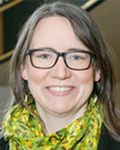
MOLLY FARRELL Associate Professor, English
Project Title | New World Calculation: The Making of Numbers in Colonial America
Project Description | What new possibilities arise if we embrace mathematics as a form of humanist inquiry? How would we tell stories differently if we came to see data as a means of personal expression? Through this project, Farrell engages questions central to the colonial archives and identities the attendant vales of historical taxonomies, categories, and classification system. New World Calculation will investigate these questions in the context of seventeenth- and eighteenth-century colonialism. It will be the first literary critical monograph exploring numeracy in colonial America. Whereas historians have documented evolving practices and traced mathematical developments, this project approaches numeracy as a form of self-expression.
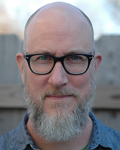
BRIAN HARNETTY (External Fellow) Interdisciplinary Artist, School of Music
Project Title | Archival Performances: Sonic Archives, Listening and Socially-Engaged Art
Project Description | Archival Performances is a series of essays exploring Harnetty’s two-decade history with music, sound and listening practices based on sound archives and the communities connected to them. Moving between music composition, sound art, sonic ethnography and socially-engaged art, Harnetty has worked with archives across Appalachia and the Midwest including the Berea Appalachian Sound Archives (Berea, Kentucky), the SunRa/El Saturn Collection (Chicago, Illinois), the Anne Grimes Collection (Library of Congress), the Little Cities of Black Diamonds Archive (Shawnee, Ohio) and the Thomas Merton Collection (Louisville, Kentucky). This project will articulate Harnetty’s creative practice and the strategies used in relation to the historical, social and cultural contexts of each archive project.
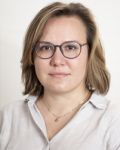
JULIA KEBLINSKA (External Fellow) Department of East Asian Languages and Literature
Project Title | Pulpy Socialisms: Trashy Archives and the Emergence of Postsocialism
Project Description | This project is a media archaeology that seeks to understand the transition from late socialism to early postsocialism in Poland and China through the “pulpy archive,” informal collections of cheap texts and obsolete media objects. In foregrounding the word “pulpy,” Keblinska points to theoretical and methodological problems related to socialist archives. First, in its reference to low genres, “pulpy” serves a counterweight to official and underground archives of socialist culture. Second, “pulpy” points to materiality, literally that of the very paper “pulp fictions” were printed on, but more broadly, to various cheap media objects that are more often considered trash than artifact. Pulpy archives, in other words, are unimportant to the state and to (most) scholars; this project in turn considers all manner of pulpy collections, examining their emergence together with the cultural paradigm of postsocialism.
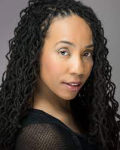
CRYSTAL PERKINS Assistant Professor, Dance
Project Title | Cookbook Project
Project Description | This project is an ancestral evocation, living archive, communal design and intergenerational strategy wrapped within dance-making practices that hopes to protect and sustain Black women’s presence in the world. It asserts that Black women’s bodies are archives for a specific way of being and creating, and we learn that through transmission and generational practice. As an embodied archive that is rooted in the ways Black women move through homes and share generational knowledge, this work details blueprints for thriving in a threatening world. Outcomes include a published manual of recipes rooted in Black feminist approaches and articulated improvisational dance scores alongside archival gatherings found in both object and spirit.
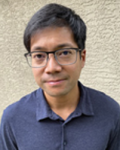
MARTIN PONCE Associate Professor, English
Project Title | Unmaking Exceptionalisms: Contending Empires, Nations and Sexualities in Asian American Literature
Project Description | Ponce’s project considers the relation of literary works to historical archives, oral interviews and published testimonies, which he describes as “testimonial counter-archives.” Unmaking Exceptionalisms analyzes contemporary historiographical Asian American literature through the frameworks of transnationalism, U.S. empire and queer diasporic critique. It elucidates the intellectual and political conundrums that arise when Asian American studies’ panethnic field-imaginary collides with intra- and inter-national historical violences and atrocities in Asia that the transnational turn makes starkly visible. Ultimately, the project suggests that the literature’s critical engagements with the histories of Asian nationalisms, inter-Asian rivalries, and anti-communist refugee politics call for a transnational analytic that accounts for contending forces without recurring to the pernicious deployment of Asian American model minority exceptionalism as an alibi for U.S. empire.
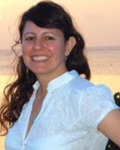
MICHELLE WIBBLESMAN Associate Professor, Spanish and Portuguese
Project Title | Archival Imaginations: Kawsay Ukhunchay Andean and Amazonian Indigenous Art and Cultural Artifacts Research Collection
Project Description | Imagine what our libraries and knowledge banks would look like if we included Indigenous art as text in its own right alongside book holdings. What new methods of inquiry would this provoke? How might the inclusion of and engagement with Indigenous meaning-making traditions inform explorations of alternative knowledge systems and implementation of DEI practices, stir critiques of established institutional models, and advance decolonial rethinking and restructuring of archives/collections as well as the roles of archivists/curators? These questions lie at the heart of Ohio State’s Kawsay UkhunchayAndean and Amazonian Indigenous Art and Cultural Artifacts Research Collection, which is the subject of Wibblesman’s project.
Facilitators

WENDY S. HESFORD (she/her) | Faculty Director, Global Arts + Humanities; Professor, Department of English; Ohio Eminent Scholar of Rhetoric, Composition and Literacy
Wendy S. Hesford is a professor of English and Ohio Eminent Scholar of Rhetoric, Composition and Literacy and the Faculty Director for the Global Arts + Humanities Discovery Theme. She has affiliate appointments in women’s, gender and sexuality studies and comparative studies. She is interested in the transformative role that critical human rights literacy plays in exposing the violence of representation, revealing hidden, repressed and silenced stories.
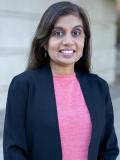
MYTHELI SREENIVAS GAHDT Leadership Faculty Fellow; Professor, Departments of History, and Women's, Gender and Sexuality Studies
Mytheli Sreenivas' work centers on the history of modern South Asia, with a focus on women’s and gender history, the history of sexuality and the family, colonialism and nationalism, and the cultural and political economy of reproduction. Broadly speaking, she is fascinated by how certain gendered norms that we often assume are constant and unchanging — such as about family, kinship, reproduction, sexuality or love — are actually deeply intertwined with historical change in the modern world.
2021-22 Society of Fellows Cohort
Fellows
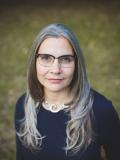
MARGARET FLINN (she/they) | Associate Professor, Department of French and Italian
Project Title | Eco-French? The Local, the National and the Global in Contemporary Popular Visual Culture
Project Title | In this book project, Flinn argues that contemporary French film, TV and comics respond directly or indirectly to the threats humanity has posed to itself through climate change, via a positively-framed mobilization of historically-nationalist mythologies about French cultural exceptionalism. Thus, we see environmental politics bringing together leftist back-to-the-land progressives with nationalists invested in mythologies about ruralism, white French peasantry and cultural capital. This project brings together films and comics with mainstream French and transnational film, TV and comics that approach human extinction and climate changes.
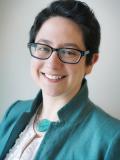
HANNAH KOSSTRIN (she/her) | Associate Professor, Department of Dance
Project Title | Kinesthetic Peoplehood: Dance, Israel and the Jewish Diaspora
Project Abstract | This book project shows how transnational cultural currents affect Jewish choreographers’ work circulating between the Americas and the Middle East through migrations, dance touring and inter-cultural collaborations from the 1950s to the 2010s. In this book, Kosstrin theorizes what she calls “kinesthetic peoplehood,” which is how people feel connected to or estranged from the Jewish diaspora through dance practices. Kosstrin builds on the transnational phenomenon of Jewish peoplehood and on theoretical-political conversations engaging diasporism, which is Jewish political solidarity not reliant on a nation-state. She argues that diaspora lives in the kinesthetic-empathetic and embodied-corporeal experiences of participating in dance events.
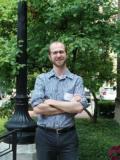
BEN McKEAN (he/him) | Associate Professor, Department of Political Science
Project Title | Freedom and Resentment in the Anthropocene
Project Abstract | McKean’s research explores how to build solidarity in the face of climate catastrophe. Radical restructuring of our social and economic institutions must happen immediately to avoid greater disaster, yet this urgency is largely not reflected in politics. Motivating political action typically requires articulating both an interest in a particular outcome and some hope that it might be realized. Both can be facilitated by imaginative identification with a group working to realize a shared interest. In previous work, McKean developed an account of solidarity grounded in a shared interest in resisting the injustices of the neoliberal global economy; in this research, they sought to transform that account to make it adequate to the prospect of climate extinction.
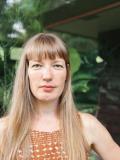
KRIS PAULSEN (she/her) | Associate Professor, History of Art
Project Title | Flesh in the Machine
Project Abstract | Paulsen’s book, Flesh in the Machine, will examine how our corporeal bodies are implicated in – or completely left out of – contemporary imaginings of humanity’s future. Looking to a series of speculative works in art, fiction and film, Paulsen will analyze the political, cultural and social consequences of the “technological fixes” for the increasingly-uninhabitable Earth and potential human extinction: Whole Brain Emulation and consciousness uploading, decamping to Mars, trans-humanist augmentation to adapt to new climates and new worlds, and AI and the predicted technological singularity as the evolutionary successors to contemporary humans. Artwork addressed in this manuscript trace the seams where our fleshly bodies meet the virtual world.

JACOB RISINGER (he/him) | Associate Professor, Department of English
Project Title | Improbable Powers: Re-imagining Energy in the Industrial Revolution and Beyond
Project Abstract | In this book project, Risinger borrows a phrase from Mary Wollstonecraft to highlight the unruly development of “power” as an aesthetic concept in Romantic writing. While literary scholars have long been invested in tracing the circulation of discursive power, he argues that this figurative conception of power has overshadowed a more elemental preoccupation. Romantic writers were often vociferous critics of the social and environmental toll of industrialization, but they were also prone to draw strange lines of connection between their own poiesis and the watermills and steam engines that gave rise to the Industrial Revolution. Risinger aims to chart the fact of a convergence and explore the “re-imagining” that such a convergence continues to enable.
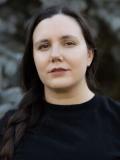
ELISSA WASHUTA (she/her) | Assistant Professor, Department of English (Creative Writing: Nonfiction)
Project Title | Apocalypse Cosmology
Project Abstract | Apocalypse Cosmology is a personal essay collection narrating Washuta’s experience as a chronically-ill Native woman insisting on survival between apocalypses, in a world headed toward its eventual end. Through examinations of virology articles, post-apocalyptic video games, the journals of Lewis and Clark, films about the 2008 financial crisis and other sources, Washuta works to answer high-stakes questions: Why am I sick? How can I imagine a future? In what ways am I living with the legacy of colonial apocalypse? In an America that insists we forgive and forget, Washuta document her fears, her history and the inheritance of violence she has no choice but to hold forever.

JASPER WAUGH-QUASEBARTH (he/him) | (External) Postdoctoral Researcher, Department of Comparative Studies
Project Title | Finding the Singing Spruce
Project Abstract | Waugh-Quasebarth is building upon existing research partnerships to explore how communities in mountain forest regions are imagining new futures through cultural heritage despite ongoing ecological, economic and social extinction crises. With partners in the Little Cities of Black Diamonds micro-region of Southeast Ohio, the Allegheny Mountains of West Virginia and the Transylvania Region of the Carpathian Mountains in Romania, Waugh-Quasebarth will explore common challenges that threaten communities’ existence as well as unique solutions arising from place-based cultural heritage to “compare notes” and imagine new futures. Together, they will ask how post-extractive landscapes and places are remade and re-enchanted by new forms of creative practice.

CARMEN WINANT | Associate Professor, Department of Art
Project Title | Notes on Fundamental Joy
Project Abstract | Notes on Fundamental Joy will build on an existing collaboration with the photographer and former lesbian separatist Carol Newhouse. Now 75, Newhouse has never had or shown her work in an art exhibition; the Wexner Center for the Arts will host Newhouse’s solo show in autumn 2022, which will be accompanied by educational programming. Newhouse’s oeuvre is comprised of thousands of negatives — many of them never printed — of womyn in the process of moving to the land and establishing new lives together with entirely-new, non-patriarchal value sets. Together, these images — of physical labor, intimate moments, educational workshops (and more) — form a compelling document of this little-known, utterly-courageous social experiment.
Facilitator

WENDY S. HESFORD (she/her) | Faculty Director, Global Arts + Humanities; Professor, Department of English; Ohio Eminent Scholar of Rhetoric, Composition and Literacy
Wendy S. Hesford is a professor of English and Ohio Eminent Scholar of Rhetoric, Composition and Literacy and the Faculty Director for the Global Arts + Humanities Discovery Theme. She has affiliate appointments in women’s, gender and sexuality studies and comparative studies. She is interested in the transformative role that critical human rights literacy plays in exposing the violence of representation, revealing hidden, repressed and silenced stories.
2020-21 Society of Fellows Cohort
Fellows
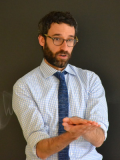
THOMAS DAVIS Associate Professor, Department of English
Project title: Unnatural Attachments: The Arts of Environmental Justice
Project abstract: Davis' project conceptualizes the relationship between attachment formation to place and its impact on environmental humanities research and activism. He details the conditions under which attachments are made and unmade by examining twentieth- and twenty-first-century fiction, and visual art that includes contemporary drone art by Indigenous activists contesting pipelines and mineral extraction.
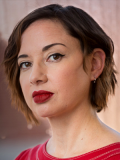
PALOMA MARTINEZ-CRUZ Associate Professor, Department of Spanish and Portuguese
Project title: Becoming Essential: A Neoliberal Fantasy of the Migrant Worker's Body
Project abstract: Martinez-Cruz’s research examines how the pandemic has engendered new conversations about who is an “essential” worker and argues that a mapping of south-to-north migrations should be informed by a human rights perspective.
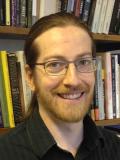
TRISTRAM MCPHERSON Associate Professor, Department of Philosophy
Project title: Rights and Responsibilities of the Anthropocene
Project abstract: McPherson will explore the Anthropocene through three linked ethical questions relating to non-human animals, individual responsibility and methodologies for the study of ethics. He hopes to develop novel ethical concepts to enable political actors to better address pressing global challenges.
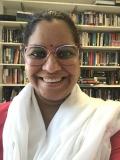
ILA NAGAR Associate Professor, Department of Near Eastern Languages and Cultures
Project title: Language and Propaganda: Being Muslim, Female or LGBTQ+ in Contemporary India
Project abstract: In India, politicians and news media weaponize language to diminish democratic principles and incite violence against non-dominant populations. Nagar studies how supporters of the Indian movement toward Hindu fundamentalism use linguistic trickery to marginalize Muslims, women, and LGBTQ communities.
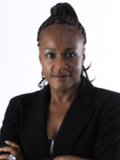
ELAINE RICHARDSON Professor, Department of Teaching and Learning
Project title: Underlying Conditions: Black Women, Girls and Corona — A One-Woman Show
Project abstract: Richardson will create a one-woman show that illuminates how intersecting gender, class and racial vulnerabilities shape Black women and girls’ experiences navigating the COVID-19 pandemic and the systemic inequities that structure their lives.
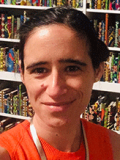
INÉS VALDEZ Associate Professor, Department of Political Science
Project title: Human Rights and Cultures of Empire: Labor Rights, Migrant Rights and the Origin of Contemporary Democracy
Project abstract: Valdez’s project explores the imperial genealogy of labor and immigrant rights during the late nineteenth and early-twentieth centuries. During this period, the white working class in the U.S. and English settler colonies — both foreign and native — adopted imperial discourses of racial hierarchy to exclude migrants of color from jobs and land, shaping the meaning of popular sovereignty.
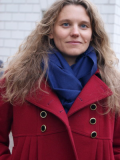
SARAH VAN BEURDEN Associate Professor, Departments of History and African and African American Studies
Project title: Rights and Restitution: The Past and Future of Cultural Heritage
Project abstract: Van Beurden will develop her project on the repatriation of Belgian colonial collections by addressing the distance between the theory of human rights and UNESCO regulations on cultural heritage and the persistent demands for the restitution of African colonial collections that have recently reemerged in force.
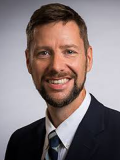
JOEL WAINWRIGHT Professor, Department of Geography
Project title: Race, Space and the Formation of Law in Belize
Project abstract: Does sovereignty always precede the rule of law, or does the rule of law produce sovereignty? In his study of the colonization of indigenous lands of the Americas, Wainwright hypothesizes that the rule of law arrives as a means of ordering space, bodies and justice, realizing an immanent structure of racial difference.
Facilitators

WENDY S. HESFORD Faculty Director, Global Arts + Humanities; Professor, Department of English; Ohio Eminent Scholar of Rhetoric, Composition and Literacy
Hesford's research and teaching focus on the transformative role that critical human rights literacy plays in exposing the violence of representation, revealing hidden, repressed and silenced stories. She is the author of six books including Spectacular Rhetorics: Human Rights Visions, Recognitions and Feminisms.
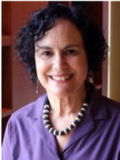
AMY SHUMAN Humanities Faculty Fellow, Global Arts + Humanities; Professor, Department of English
Shuman specializes in narrative, literacy, political asylum, disability, food customs, feminist theory and critical theory. She is a Guggenheim Fellow and the recipient of numerous awards including 2015 Distinguished Scholar Award. She is the author of six books, the most recent (with Carol Bohmer), Rejecting Refugees: Political Asylum in the 21st Century.
